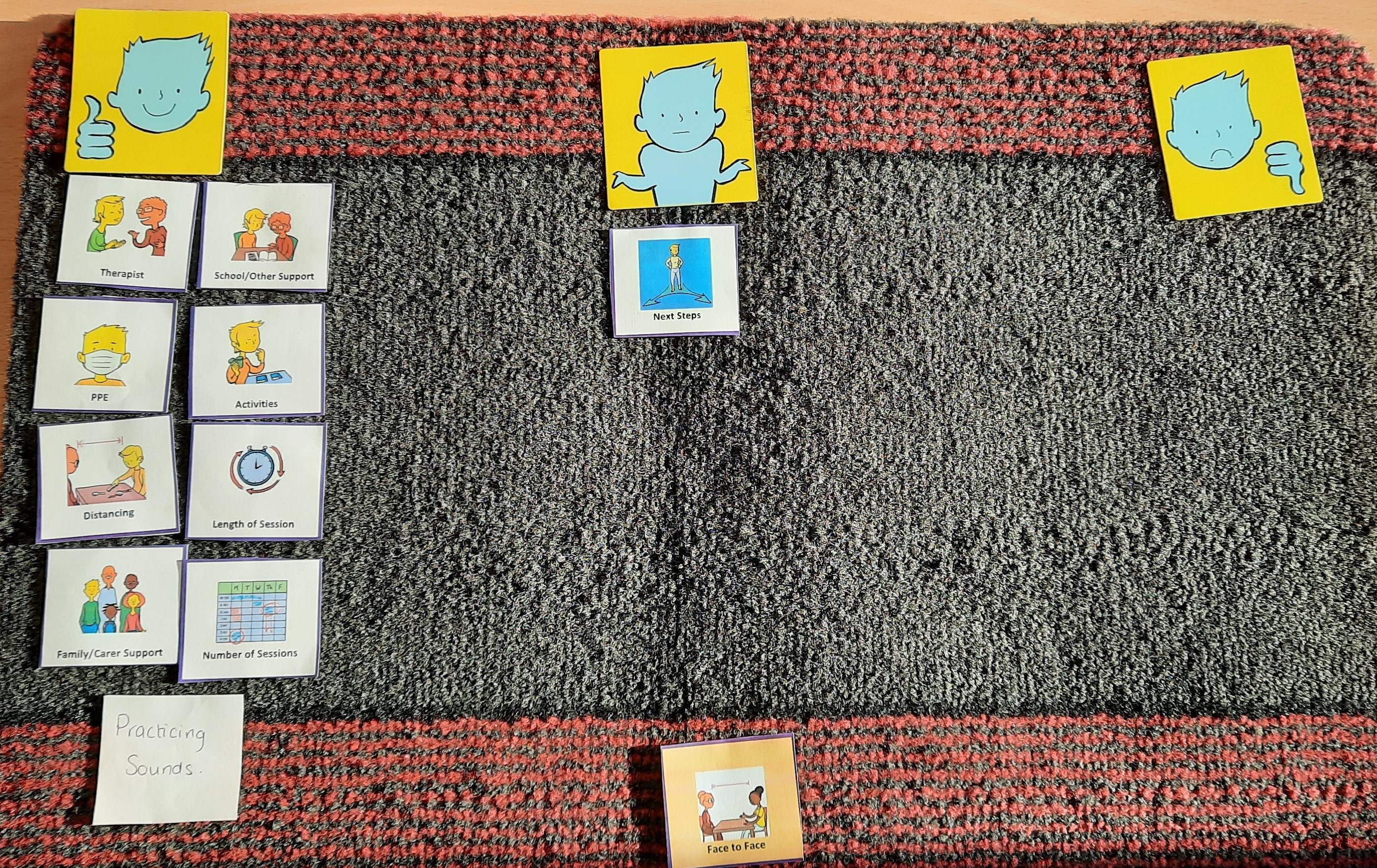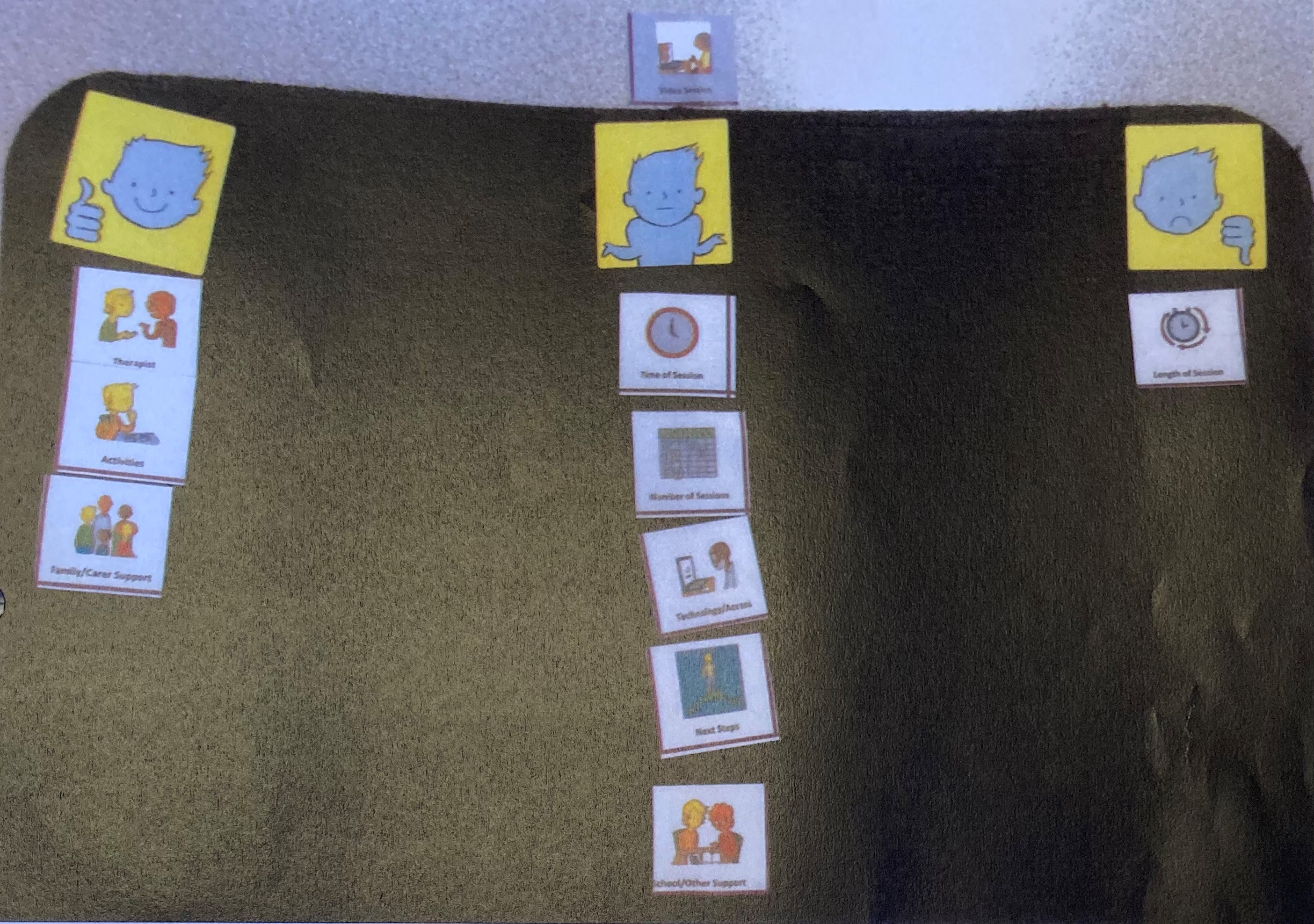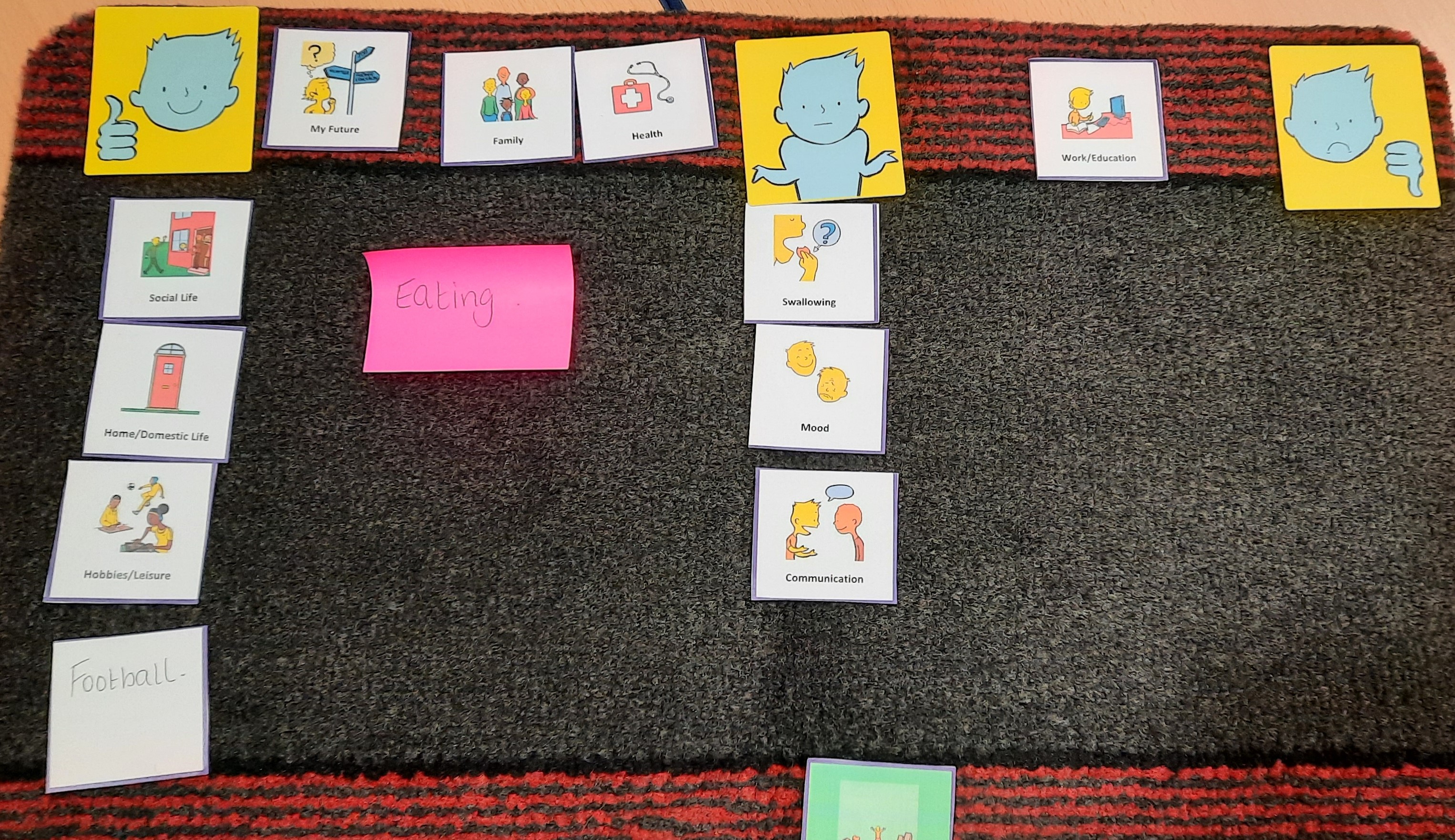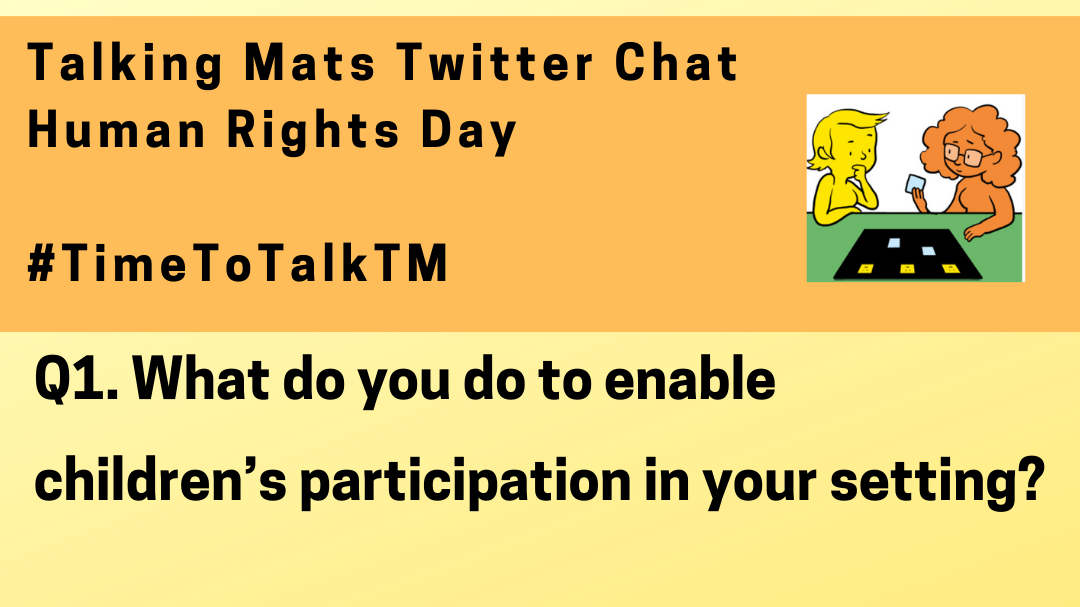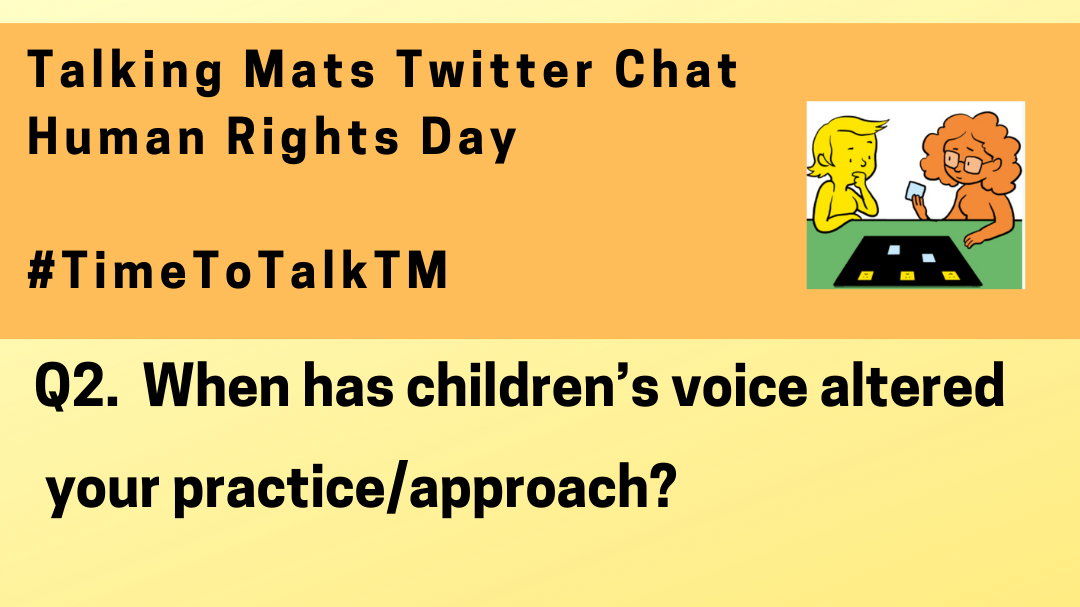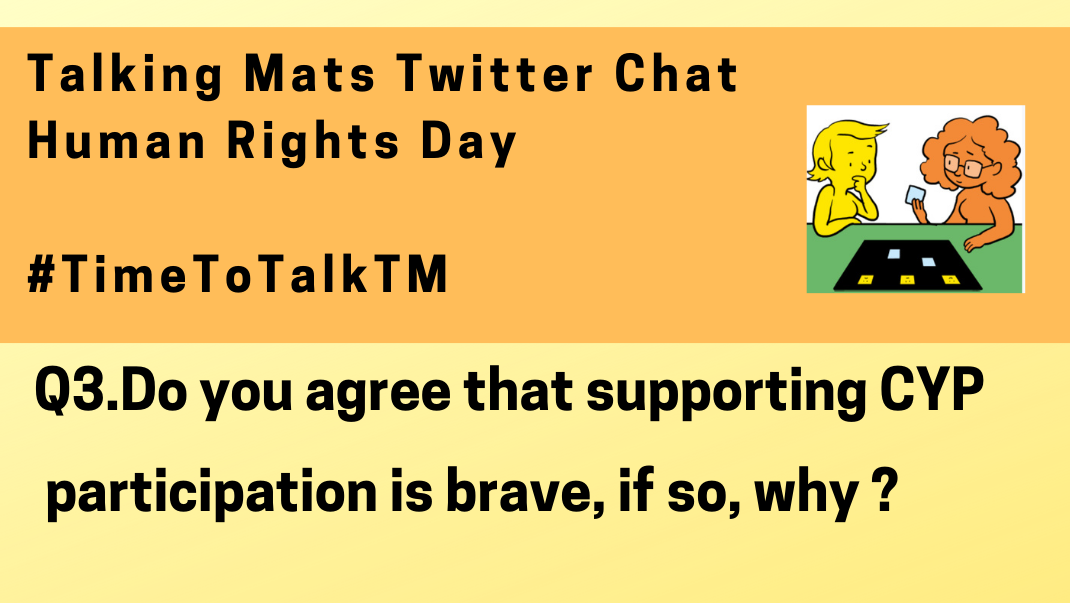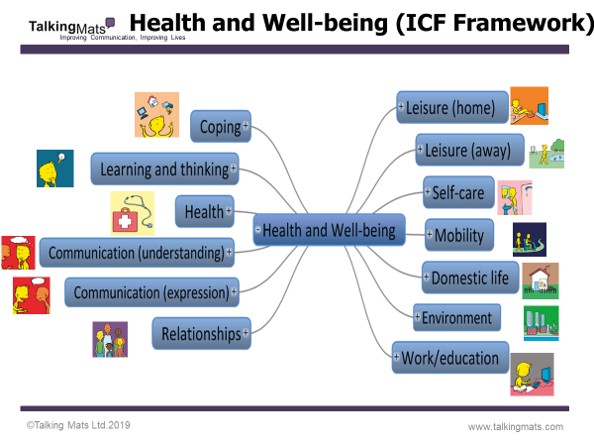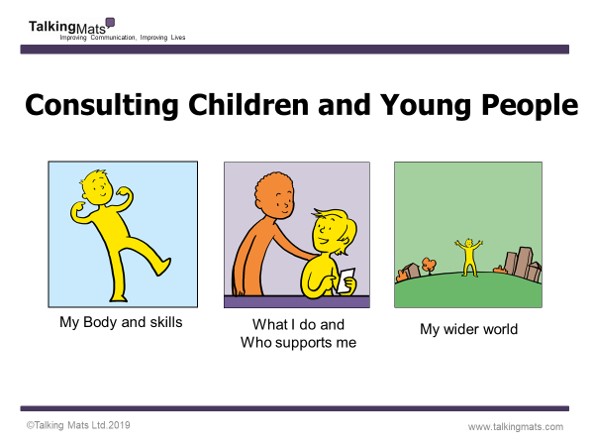Talking Mats are delighted to share that we have been awarded funding to create a brand-new sensory resource for children and young people who have Speech, Language and Communication Needs (SLCN) and sensory integration/processing difficulties. The funding to create this resource has been awarded by the Communication Trust from the Communication Consortium Grants Programme – funded by The Rayners Special Educational Trust.
The Communication Trust Consortium, a coalition of over 35 not-for-profit organisations, is hosted by ICAN. They harness collective expertise to support the workforce and commissioners to support all children and young people’s speech, language, and communication skills across the UK.
This exciting year-long project will be led by Laura Holmes, our Lead Associate for Children and Young People. Laura has been part of the Talking Mats Team since 2016 and has over 20 years’ experience of working as a Speech and Language Therapist with children and young people, across a wide variety of settings in both NHS and independent sectors.

New Sensory Resource
This project will develop, pilot and launch a Talking Mats visual communication resource to tune into a child’s view of their sensory needs. It will enable children and young people who have speech, language, and communication needs (SLCN) and sensory difficulties to have a voice in their therapy assessment, planning and intervention.
“Sensory integration” and “sensory processing” refer to the processes in the brain that allow us to take the signals from our senses, make sense of those signals and respond appropriately. Children and young people with sensory processing/integration difficulties often have speech, language and communication difficulties, which may be linked to a diagnosis of autism (Green et al 2016); developmental language disorder (Simpson et al 2020); hearing impairment (Alkhamra et al 2020); or a history of trauma (Fraser et al 2017).
This work is important as sensory assessments can typically involve a mixture of formal and informal questionnaires and checklists which are carried out with Parents/Carers, Education Staff, and may also involve observations of the child in their environment. The issue is that Child Voice is not always routinely, or effectively, included in these assessments, or in subsequent planning and intervention – however the Royal College of Occupational Therapists recommends that ‘person-centred goals/outcomes must be established prior to intervention’ (RCOT, Informed View: Sensory Integration and Sensory-Based Assessments 2021). This also links with the current SEND system in England and GIRFEC in Scotland, both of which also emphasise the importance of child voice throughout assessment, planning and intervention processes.
We plan to work with experienced Talking Mats OT and SLT practitioners working with children and young people who have SLCN and sensory needs, to co-create this resource.
Get Involved
If you, or someone you know, works with children who have a diagnosis of SLCN and sensory needs, and is an experienced Talking Mats practitioner, please share the news about this project.
If this applies to the work that you do, and you would be interested in taking part in this project, please follow this link to express your interest: Communication Trust Project.
Expressions of Interest should be submitted by Friday 23/09/22.
Stay Connected
For more information about Talking Mats, please visit our website www.talkingmats.com or follow us on social media to keep up to date with all our news!
In these challenging times during lockdown/COVID-19 restrictions we have had to deliver our Speech and Language Therapy sessions differently. In my role as a Speech and Language Therapist for the NHS Stockport Foundation Trust Buy-Back Service, I am gathering feedback from some of the children I work with, using the free RCSLT Talking Mats resource topics described in my previous blog https://www.talkingmats.com/rcslt-lockdown-survey/
Many thanks to the Talking Mats-trained Teaching Assistants, Lucie Porteus (Woodley Primary School), and Dawn Wrigley (Romiley Primary School) for carrying out these sessions with the children involved. Talking Mats is used in both schools as a tool to support children to share their views and opinions about a wide range of topics, which enables child-centred practice and target-setting.
In this blog, I wanted to share some real-life examples for each topic. The topscale used for each topic is ‘Happy/ Not Sure/ Not Happy’:
Face to Face
For this mat session, Dawn took out the symbols that were not relevant. The child was able to express that he was happy about the face-to-face sessions he had been receiving, during which the SLT has had to wear full PPE. The child added a blank to say that he was happy about ‘Practising Sounds’ in particular, and added further information about ‘Activities’, sharing that he especially liked the penguin and fishing games. The child shared that he was not sure about next steps, and so in future sessions I will ensure that these are made clearer.
Mats completed with other children on this topic have helped to explore the impact of use of PPE and a common theme has been that children have not been happy about the SLT’s mask, usually because the child cannot see the SLT’s mouth. In our school sessions we have attempted to resolve this by having a staff member who is part of their school ‘bubble’ present, who is then able to model the speech sounds/language used by the SLT. I am also aware of SLTs who have used video clips of themselves modelling speech sounds, as another potential solution.
Video
This mat enabled the child to share information about how they felt about video sessions using the Attend Anywhere platform. Lucie removed the options which were not relevant. The child was able to communicate that he felt happy about the SLT, Activities, and Family/Carer Support – he was happy that his Dad was sitting with him. The child was not sure about a few of the options such as time and number of sessions – and said that he wanted more sessions. He was also unsure about technology/access and mentioned that ‘sometimes I see her, sometimes I don’t. The child placed length of session on the negative side and said ‘I wanted it longer’. This information has helped me to plan for future video sessions, as I had previously been keeping the activities shorter to help to maintain his attention/focus. It is clear the child is happy about the activities completed and is keen for more – and longer – video sessions in future. I am also aware that I need to be clearer when explaining next steps at the end of the session, which will include letting the child know that he also be working on the activities during his keyworker time in school, with a member school staff.
My Life
This child was able to share lots of additional information during the Talking Mats session, which helped to provide a clearer picture of how he felt about his life during lockdown. For example, for ‘Mood’, he shared that ‘some days I am ok and some days I am not’. For ‘Family’: ‘sometimes I fall out with my brother and my sister annoys me’. School was between not sure and not happy because he said he “only likes Maths and topic and he really doesn’t like English”.
The child put Communication under ‘not sure’ and shared that “sometimes I struggle to talk because of that, and that makes me sad sometimes”.
The main action from this mat was to plan another Talking Mats session to submat ‘communication’, as when Dawn asked him if there was any he wanted to look at in a little more depth, he indicated the communication symbol and had said “that way I can move it from there to happy”. Another option which would be useful to explore further will be ‘mood’, to find out what helps/ does not help.
Exploring the topic ‘communication’ further will enable the child to express which aspects of communication he is feels are ‘going well/ going ok/ not going well’, which will then result in updated SLT target-setting and intervention.
The RCSLT Talking Mats Survey is open until the end of June 2021 – please make use of these free resources so that the children and adults we are working with can have their voices heard about their Speech and Language Therapy Provision during COVID-19 lockdown/restrictions. Please send your feedback forms to: peter.just@rcslt.org
Access your guidance and free resources here:
Symbol Sets: https://www.talkingmats.com/wp-content/uploads/2013/09/Symbol-Set.pdf
Guidance: TM RCSLT guidance text – March 2021
Feedback Form: TM RCSLT TM feedback form
We are looking forward to our second Talking Mats Twitter chat on Thursday 10/12/20 7.30 – 8.30pm.
Join us to discuss and celebrate our new report ‘Can Scotland Be Brave’, which has a specific focus on children and young people’s participation. Find out more about the report here https://www.talkingmats.com/new-report-to-launch-10th-dec/
The report will be launched by the Scottish Government on the same day, to coincide with Human Rights Day 2020.
Here are the questions we will be asking:
Grab a cuppa – or better still, a mulled wine and mince pie! – and join us to share experiences and ideas.
Remember to use the hashtag #TimeToTalkTM on all your posts!
In the first of two blogs, we talk about how using Talking Mats Resources can help people have better conversations.
Talking Mats provides a visual framework to help people express their views and feelings, using a selection of communication symbols that cover a variety of topics. Talking Mats resources are used by many professionals across a wide range of health, social care, residential, and education settings. Most of our resources are available in both low-tech, and digital, formats. In this first blog we focus on the resource bundles which are available to purchase with our Foundation Training course.
Our resources are available to buy through our website (https://www.talkingmats.com/shop/) however we do strongly recommend completion of one of our Foundation courses (https://www.talkingmats.com/training/foundation-training/) to get the most benefit from Talking Mats – and to use it to its full potential. If you add a Health and Wellbeing, Consulting Children & Young People, or Social Care resource pack bundle to your training you only end up paying £65 for the training day itself which is a great deal!
Resource Bundles available to purchase with Training
Health and Wellbeing Bundle:
These packs are based on the ‘activities and participation’ domains from the WHO ICF framework and includes 9 topics which are relevant to people, regardless of their health, disability or where they live around the world. We have translated these into more ‘user-friendly’ language and have generated symbols to represent each topic.
In addition to the 9 topics from the Activity and Participation domains, we have also included Environment and Health, which are important topics within the ICF framework and in people’s lives.
Consulting Children and Young People Bundle:
These packs are based on ‘Getting It Right For Every Child’ (GIRFEC), a Scottish framework for everyone to use when working with children and young people. There are three broad topics which are relevant to any child or young person’s life. This resource can also be used with SEND reforms in England. There are different packs for each developmental stage: Early years (ages 3 to 7); Primary (ages 7 to 12) and secondary (age 13 upwards).
Best Value Bundle: This option includes the Health and Wellbeing and Consulting Children and Young People bundles above, as well as our Social Care resource packs, providing a complete set of resources to support communication on a comprehensive range of topics for children and adults.
If you’d like to book a place on one of our Foundation Courses and would like to know more about our bundle options, get in touch with us at info@talkingmats.com
Find out more about our Foundation Training course here: https://www.talkingmats.com/training/foundation-training/
 Online training login
Online training login 

